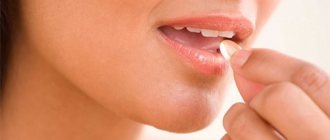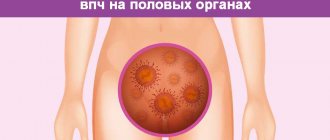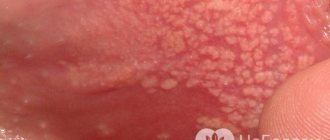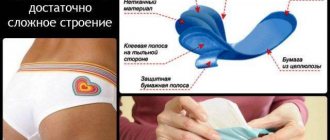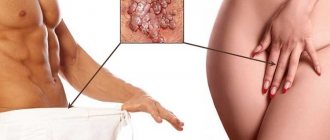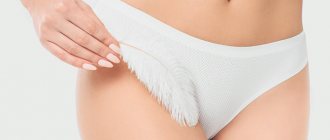The condition when a girl itches in her intimate area and really wants to scratch between her legs endlessly is familiar to almost everyone. But the burning and itching in the perineum and genital area is especially unbearable. And it’s not just about the rules of decency, which do not allow a person to ease the situation even for a while. The part of the body “below the waist” is very rich in nerve endings, and itching in the groin brings incomparable suffering. Women, encountering these sensations for the first time, almost always experience stress, as they are associated with something indecent, primarily with sexually transmitted infections...
Until now, medical science cannot clearly explain what intimate itching is. In women, apparently, this sensation appears due to very weak irritation of the nerve endings, which cannot cause “full” pain. And, oddly enough, quite serious ailments can be hidden behind this “trifling” ailment.
Causes of vaginal itching - are they dangerous?
The content of the article
The cause of vaginal itching in the greatest number of cases is inadequate or insufficient care of intimate areas. When the vagina itches and burns, a common source of the problem is the use of inappropriate cosmetics. Some medications can irritate the vagina and cause allergic reactions inside the vulva. All types of perfumed sanitary pads and tampons are also harmful. Like toilet paper, they should be unscented.
Some women complain of vaginal itching before their period. This is the result of physiological changes in hormonal balance. As a result of changes in the concentration of estrogen, mucus is produced in smaller quantities before menstruation, which can cause genital itching.
Itching of the perineum can also be caused by vaginal irrigation - douching. There is a common misconception among women that vaginal rinsing is a good form of preventing infection and maintaining adequate moisture in the intimate areas. Gynecologists argue, however, that this practice leads to the elimination of beneficial bacteria that live in the vaginal environment, which promotes the proliferation of pathogenic microorganisms.
Much more serious than vaginal itching, a consequence of regularly repeated douching is the movement of pathogens from the vagina to the upper genital tract, which is associated with the development of inflammation inside the ovaries, fallopian tubes and endometrium.
Vaginal itching can also be caused by the washing powders used - sometimes changing the powder is enough to eliminate itching in intimate areas.
The cause of irritation of the labia is also underwear - too tight or made of poor quality materials. By not allowing the skin to breathe, the fabric can cause an itchy sensation in the vagina.
What else causes burning and itching of the vagina?
Itching of the labia and vagina can in many cases be the result of excessive vaginal dryness. A common reason for these areas to dry out is dehydration, which causes vaginal itching due to lack of sufficient discharge.
Lack of adequate moisture and vaginal itching during menstruation are often caused by the use of tampons in the last days of menstruation. They dry out the mucous membrane.
Behavior related to sexual activity and pregnancy prevention plays an important role in proper hydration of the genital tract environment. Vaginal itching after sexual intercourse is a consequence of lack of proper stimulation. Vaginal contraceptives and latex condoms also increase the feeling of vaginal dryness.
Vaginal dryness and itching are also symptoms of atrophic vaginitis and vulvovaginitis. Vaginal atrophy, i.e. atrophy of the epithelium lining the genital organs is associated with the period of menopause, when changes in the hormonal balance of the body occur.
We are talking here primarily about a significant decrease in the concentration of estrogen, which is one of the main causes of itching of intimate places during menopause. A deficiency of this hormone is responsible for the thinning of the vaginal epithelium, as well as the disappearance of adipose tissue in the labia area.
In addition to vulvar itching and vaginal opening, women report vaginal burning, dryness, and contact patches of discharge, resulting in a lack of satisfaction with sexual intercourse. Atrophic changes carry the risk of formation of erosions and petechiae - hemorrhages.
Anal itching - symptoms and treatment
Anal itching is a pathological condition manifested by persistent or recurrent itching sensations in the perineal area. Most often this is a dermatological problem, less often neurological or gastroenterological, and very rarely proctological. That is why patients sometimes visit different specialists for a long time and to no avail before they establish the true cause of the disease and eliminate the main cause of itching in the anus.
Itching in the anus causes a lot of discomfort. From constant nervous tension and unpleasant sensations, patients lose weight, become aggressive, irritable, sleep poorly, and their memory and perception of information deteriorate. The prevalence of mental disorders in outpatient dermatological practice is quite high (21-34%), so the study of this problem is relevant [10][11][13].
Various ointments and medications that doctors actively use to relieve symptoms of the disease eliminate complaints only for a short period of time, but after a few weeks the problem appears in a new light and develops with renewed vigor, coping with it becomes more and more difficult each time. Itching is just the tip of the iceberg, and the essence of the problem remains hidden from the eyes of the doctor and the patient, so it is necessary to carefully examine the patient, establish the real cause, and only then begin to treat this unpleasant symptom.
Causes of anal itching
Oddly enough, usually patients suffering from itching recover only after observation by a dermatologist. Before this, as a rule, they unsuccessfully visit various specialists, starting with a coloproctologist and ending with a psychiatrist. In most patients, itching in the anus is of dermatological origin. Therefore, this symptom is eliminated by a dermatologist after an appropriate examination, identification of the true causative agent of the disease and the use of a drug that affects the cause that caused the itching and burning. Such pathogens include streptococci, staphylococci, saprophytes, yeast-like fungi of the genus Candida, trichophyton, microsporum, amoeba, lamblia and many others.
Disturbance of the microflora of the perianal area
The cause of dermatological diseases is most often a violation of the microflora of the perianal area (around the anus). As a rule, this is associated with fungi - actinomycosis, candidiasis (thrush). The fungus can be infected from the outside, we are talking about violation of personal hygiene: using other people's things, bed linen, as well as self-infection with dirty hands during perineal hygiene after stool.
Itching in the anal area after taking antibiotics
The fungus can also “grow” due to the death of normal microflora in the anal area and its replacement by a pathogenic one, against the background of a weakened general immune system, long-term use of antibiotics or other potent drugs, as well as due to some concomitant disease.
Many patients have problems with the microflora large intestine , which is the cause of gastroenterological pathology. Very often, when collecting anamnesis, it turns out that a patient suffering from itching in the anus used antibacterial agents to treat some disease. While taking antibiotics, the phenomena of dysbiosis increased, the microflora of not only the intestines, but also the skin of the perineum was disrupted. In turn, disruption of the microflora led to the death of normal microorganisms inherent in a given environment and their replacement by pathogenic microbes that cause itching and burning.
Anal itching in chronic diseases
The presence of chronic diseases such as diabetes mellitus, obesity, hemorrhoids, paraproctitis (purulent inflammation of the fatty tissue around the rectum and anal sphincter), Crohn's disease (chronic inflammatory bowel disease), ulcerative colitis, dysbiosis of the large intestine, adnexitis (inflammation of the fallopian tubes and ovaries), cystitis, sexually transmitted infections, endocrine pathologies, metabolic disorders, etc. leads to an increase and increase in the incidence of itching due to the negative impact on the immune system and weakening of the body's strength in general.
Environmental factors
Currently, people of young working age who do not have concomitant pathologies and consider themselves practically healthy suffer from itching more and more often. Anal itching began to appear at a young age due to poor ecology, antibiotic resistance (resistance of microbes to antimicrobial chemotherapy), polyvalent allergies (the body's sensitivity to several types of allergens at the same time), the use of synthetic things, thong-type underwear, promiscuity, etc. .
Allergy
Local allergies are also a common cause of anal itching with intolerance to some suppositories and ointments used to treat hemorrhoids, prostatitis or gynecological pathologies.
Depilation
Depilation of the perineum also often leads to these symptoms, especially if after the procedure you use an ointment or cream that “clogs” the pores, resulting in their inflammation. If such a problem exists, then it is best to use creams for infants with a low Vaseline content that are quickly absorbed, for example Bepanten.
Infectious diseases
Human papillomavirus , herpesvirus and other infectious viruses are the cause of the appearance of pathological benign formations on the skin, such as anogenital warts [9] . These formations become injured, become inflamed, and produce additional fluid or exudate, which affects the skin and causes itching in the anus.
Crohn's disease
Perianal lesions in Crohn's disease can lead to an increase in enzyme levels, local purulent manifestations in the form of paraproctitis or rectal fistula, which negatively affects nerve receptors and leads to itching . The constant leakage of pus from the fistula openings in Crohn's disease makes itching a constant symptom inherent in this particular disease.
Itching in the anus with tumors
Various neoplasms and tumors in the intestinal cavity or other parts of the gastrointestinal tract can also cause itching. Such tumors often develop asymptomatically, which contributes to imperceptible total damage to intestinal tissue; itching is the first symptom of cancer. Sometimes people who go to the doctor with this single complaint undergo a full examination and identify the underlying, life-threatening problem. Often in such cases it is possible to save a person from death due to a malignant neoplasm. Therefore, you cannot ignore this symptom or self-medicate, but you must immediately be examined and treated by specialized specialists.
Psycho-emotional stress
It is important to note that in addition to somatic causes, anal itching can occur due to psycho-emotional stress and other neurological symptoms - that is, neurogenic itching is in no way related to the physical pathology of this localization. As a rule, neurogenic itching accompanies other mental disorders. To solve this problem, consultation with a psychiatrist or neurologist is necessary. Local therapies used by the patient to relieve symptoms of the disease, as a rule, do not have any beneficial effect. Only sedatives or sedatives help temporarily relieve itching.
Itching in the anus at night
One of the causes of anal itching at night may be a parasitic infection. When infected with worms, the parasites emerge from the anal canal to lay eggs and provoke unbearable itching.
When wearing warm, breathable clothing, a person sweats and the itching worsens. Also, exposure to cold in winter can significantly increase complaints of itching.
Itching in the anus after bowel movement
After bowel movement, the itching in the anus intensifies. The reason for the increased itching is that during the act of defecation, anal fissures are injured due to damage to the skin and mucous membranes.
Anal itching in children
There are no specific features of anal itching in children; its manifestations are the same as in adults.
Itching of the labia and vulva with intimate infections
Itching of intimate areas may mean vaginitis. Several symptoms indicate an infection - redness, burning and itching of the intimate areas.
Sometimes the disease is not limited only to the vulva, but has the character of a generalized infection, during which, in addition to itching in the vaginal area, an increase in temperature and indicators of inflammation in laboratory tests can be observed.
Vaginal mycosis is one of the common causes of itching of the vulva and labia. The disease is caused by colonies of fungi of the genus Candida, popularly called yeast. They also inhabit the vaginal area under physiological conditions, but in numbers that do not pose a threat to health.
A slight decrease in immunity, even caused by menstruation, can become an incentive for yeast to multiply. This is also facilitated by the use of antibiotics. Burning and itching of the vagina is not the only symptom of ringworm. There are also characteristic discharges - thick, white, with the consistency of cottage cheese.
Women suffering from this type of intimate infection report vaginal pain and pain during intercourse. Treatment should be preceded by a vaginal smear to identify the pathogenic pathogen and implement appropriate therapy.
It is especially important if candidiasis manifests itself as vaginal itching during pregnancy, both at the beginning and before childbirth. Due to hormonal changes and decreased immunity, women are especially vulnerable to candidiasis at this time.
Bacterial vaginosis is another disease associated with itching of private parts. The reason is dysbacteriosis caused by anaerobic bacteria. Women who do not follow the rules of intimate hygiene and struggle with various types of hormonal disorders are at risk.
The predominant symptoms are vaginal itching, burning, pain when urinating, or a characteristic vaginal discharge with a fishy odor. Treatment is antibiotic therapy.
If you have vaginal discharge or itching, you should always consult a gynecologist. Even mild itching should be a cause for concern if it is frequent and recurring.
Treatment of intimate itching
If you have discharge, itching and itching in an intimate place inside or outside, or other discomfort, do not delay solving the problem! To establish the cause and get rid of the disease, not much is needed ⇨ it’s to make an appointment with a gynecologist and undergo a full diagnosis. Our doctor will conduct an examination and the necessary examination, based on the results of which effective treatment will be prescribed.
Tests for itching in the intimate area
Tests will help you find out why the intimate part of a woman, a young girl, including a virgin, as well as teenagers and younger girls itches. Depending on the age of the patient, the complaints made and the result of the examination of the genitals on the chair, to clarify the cause of the itching, the gynecologist may prescribe something from the following list of tests:
- Flora smear
- PCR for hidden infections
- Bacterial seeding of discharge
- Florocenosis analysis
- Blood for hormones
- Blood for some infections
- Blood chemistry
- Scraping for oncocytology
How to treat itching in intimate areas?
To eliminate itching in the vagina and itching of the labia majora and minora, in many cases it is enough to change the intimate hygiene product or buy new underwear. In other situations, it is necessary to diagnose the vaginal component. Smear analysis allows you to determine the etiology of the infection and decide what will be most effective for vaginal itching in a particular case.
For bacterial vaginosis, completely different medications are used than for burning and itching of the labia and vulva caused by thrush. Candidiasis also requires quite a long treatment - lasting up to several months. Only consistent pharmacotherapy brings results.
Constant vaginal itching may be the first sign of diabetes. Therefore, it is necessary to determine the level of glucose in the blood serum. In this case, the regulation of carbohydrate metabolism will eliminate the discomfort.
If the source of the problem is vaginal dryness during menopause or after stopping hormonal contraception, a drug to treat vaginal itching is vaginal suppositories. Due to the high content of hyaluronic and lactic acid, they moisturize the mucous membrane and additionally promote epithelial regeneration. This reduces the risk of microtrauma.
Where to find the right doctor?
Regardless of what kind of doctor you need, you can find him using the “Your Doctor” service. It allows its visitors to analyze the offers of various private clinics and select those that are located in the most convenient way and have a suitable specialist on staff.
As an additional service, the site allows visitors to fill out an online form and call a dermatologist at home or make an appointment with a specialist of their choice at a time of interest.
Publication date: 2018-02-03
Methods for diagnosing skin diseases:
- Diagnosis of skin diseases
- Diagnosis of skin diseases at home
- Diagnosis of allergic skin diseases
- Diagnosis of bacterial skin diseases
- Diagnosis of viral skin diseases
- Diagnosis of hair diseases
- Diagnosis of nail diseases
- Diagnosis of skin tumors
- Skin scraping
- Blisters on the skin
- Dermatoscopy
- Demodex tests
- Diagnosis of sexually transmitted infections
- Mushroom tests
- Skin scraping

